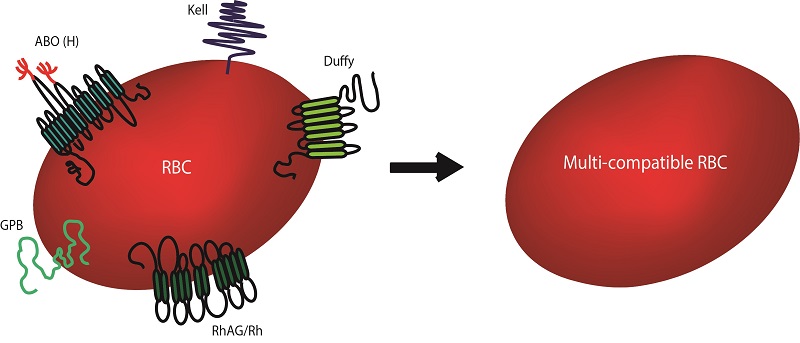Scientists use gene editing to improve red blood cell transfusion compatibility
Scientists at the University of Bristol have succeeded in generating laboratory made red blood cells with rare blood group types that could one day be used to help patients that cannot be matched with donor blood.
30 April 2018
Using CRISPR-Cas9 mediated gene editing, the scientists at the NIHR Blood and Transplant Research Unit (NIHR BTRU) and NHS Blood and Transplant in Bristol were able to make individual cell lines in which specific blood group genes were altered to prevent the expression of blood group proteins that can cause immune reactions.
By using this approach to prevent expression of multiple blood group genes within a single line they were able to produce cells with extremely broad transfusion compatibility.
The provision of blood for patients who require repeated blood transfusions, as well as for individuals with rare blood types presents an enormous challenge to transfusion services worldwide. Most of us can safely receive a blood transfusion from donated blood, however patients with blood disorders such as thalassemia or sickle cell disease require frequent transfusions.
With repeated transfusion, patients eventually develop an immune response due to incompatibility of minor blood group antigens. Individuals with rare blood group phenotypes require difficult-to-source blood from individuals with the same rare phenotype. If this is not available, the patients risk serious complications.
Transfusions of red blood cells edited to improve compatibility could provide better treatments for those patients whose clinical needs are difficult to meet.
The study, published at 10am on Thursday, April 26th in the prestigious EMBO Molecular Medicine journal provides the first proof of principle demonstration that gene editing can be used in combination with laboratory culture of red blood cells to generate rare or customised red blood cells for patients with specific needs.
Whilst the authors are keen to stress the many challenging technical obstacles that must be overcome before this approach could be translated to a clinical product, the work does provide an exciting window into the possible applications of red blood cells produced from gene edited cell lines.
Dr. Ashley Toye Director of the Bristol NIHR BTRU said: “Blood made using genetically edited cells could one day provide compatible transfusions for a group of patients for whom blood matching is difficult or impossible to achieve within the donor population. However, much more work will still be needed to produce blood cells suitable for patient use.”

Enhancement of red blood cell transfusion compatibility using CRISPR-mediated erythroblast gene editing:
1. Hawksworth, T.J. Satchwell, M. Meinders, D.E. Daniels, F. Regan, N.M. Thornton, M.C. Wilson, J.G.G Dobbe, G.J. Streeska, K. Trakarnsanga, K. Heesom, D.J. Anstee, J. Frayne and A.M. Toye
doi: 10.15252/emmm.201708454
- The paper is available on the EMBO Molecular Medicine journal website.
The illustration shows the various blood groups that are usually present on red blood cells and which have been removed using CRISPR-Cas9 in a single cell line to create a multi-compatible red blood cell.
Ends
For additional information please contact the NHS Blood and Transplant Press Office on 01923 367 600 or email pressoffice@nhsbt.nhs.uk
Press Release Notes
- NHS Blood and Transplant is a joint England and Wales Special Health Authority. We are responsible for ensuring a safe and efficient supply of blood and associated services to the NHS in England. We are also the organ donation organisation for the UK and are responsible for matching and allocating donated organs.
- The researchers are grateful for funding from the National Institute for Health Research (NIHR), NHS Blood and Transplant (NHSBT) R&D, EPSRC/BBRSC funded BrisSynBio Centre and the EPSRC SynBio Centre for Doctoral Training (CDT) with Defence Science and Technology Laboratory (DSTL) as an industrial partner.
- The National Institute for Health Research (NIHR): improving the health and wealth of the nation through research. Established by the Department of Health and Social Care, the NIHR:funds high quality research to improve health; trains and supports health researchers; provides world-class research facilities; works with the life sciences industry and charities to benefit all; involves patients and the public at every step. For further information, visit the NIHR website www.nihr.ac.uk